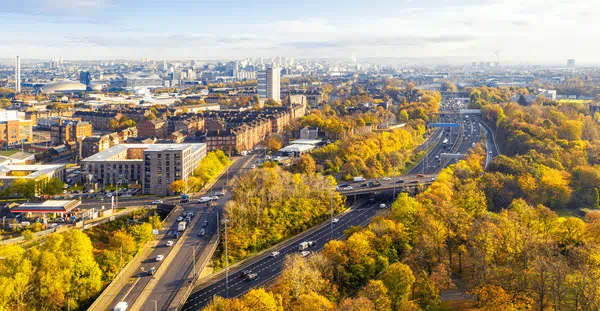The spread of Covid-19 has drastically changed how communities live, travel and exist. From breaking old certainties to the acceleration of new trends, it has forced us to quickly adapt to new ways of living whilst for many working from home, home schooling and maintaining a family environment. While some of the longer-term effects may take years to be fully understood, there is a now a pressing need for action to rebuild our economy and level up.
When it comes to building the future economy, the latest budget includes some fast, local money - including the Towns Fund and the first tranche of the Levelling Up Fund, a £4.8billion fund to be bid for by local areas. In practice, this is a long-term budget setting-up a platform for a 2024 election. Most of the measures, incentives, support for training, new sources of capital, and even freeports, will take time to come to fruition, but feel like they are going in the right direction.
For the West Midlands, recent announcements around five new rail stations will certainly improve access to jobs and opportunities in Birmingham, Wolverhampton and Walsall. The region will also benefit from a £155 million Towns Fund, following a series of successful bids, and the West Midlands Combined Authority will receive £8.9 million in capacity funding to support preparations for intra-city transport settlements.
It is very welcome news, particularly for an area which has been disproportionately hit by the Covid crisis and youth unemployment being a real concern. Pre-Covid, things were looking very promising for the region and momentum was building around several schemes, largely driven by Birmingham being the host City for the Commonwealth Games in 2022 with several cross regional projects including; the new Aquatics centre in Sandwell and mountain bike trails for Cannock Chase. For instance, ongoing residential and commercial development in Birmingham, the moving forward of Coventry’s South side project and the ongoing activity around the station and in the city centre of Wolverhampton, that is not to mention the impact of the Commonwealth Games, City of Culture and of course HS2.
With Coventry getting set to be the City of Culture in 2021, a rise in thriving student accommodation in the region and with the area marked as the first flying taxi location, there is certainly a lot to be excited about. Meanwhile, the devolution deal, a Combined Authority and clarity around future projects, as well as the fact it was the first region to have a local industrial strategy, has created a pipeline for growth.
Of course, no one could have imagined the upheaval that was to come with Covid-19, but now is the time to build ourselves back stronger than ever. We need to redefine ourselves and established what sectors we want the region to thrive in and be famous for. Through the government’s Build Back Better funding, we must invest in Giga factories, life sciences, healthcare innovation and new housing to stimulate the local economy. It goes without saying that HS2 will also be a huge boost for the area and we will see investment becoming reality at a local level. Going forward, a focus on an agenda for inclusive growth is pivotal and we must make sure the region is Covid-proof and more resilient for the future.
Stronger communities need to be at the heart of plan. This must involve a renewed focus on the principles of community wealth building and the ideas around a ‘15-minute community’ to improve health, homes and mobility. Birmingham City Council’s ‘Our Future City Plan’ is embracing the concept in its a ‘City of Centres’ element – one of several forward-looking elements of a bold and ambitious plan that has been launched during the pandemic and that looks beyond the current crisis to a bright future.
More than ever the private sector has an essential role to play supporting local authorities in managing these challenges and delivering stronger communities. It is critical we do not forget the placemaking opportunities associated with major rail and station investment, as seen at London Kings Cross-St Pancras. This project involved £2.2billion of private investment including new offices, jobs and homes in the area. We want to see this kind of regeneration replicated in our cities and towns.
Crucial to these plans will be investing in skills. At Arcadis, we are working with schools, colleges and universities to help them transform how they deliver their educational courses to achieve better outcomes. As an example, to ensure the future labour force is equipped with the necessary skills, our colleagues have been providing voluntary support to skills and educational programmes in Birmingham, through our facilitators, The Ahead Partnership. This has targeted schools within some of the most deprived areas of the city and is an effective way in increasing attainment, raising aspirations and improving inclusivity. The entrepreneurial and technology skills being nurtured in our regional towns and cities will support a more dynamic local labour market that works for all.
The construction and property sector will be required to recruit from other industries, increase productivity and dramatically reduce waste if it is to overcome a drastic skills shortage. Arcadis is already recognising this change by encouraging all of our staff to undertake digital skills training as part of a ‘digital basecamp’, as a way of re-aligning skills to current and future market needs.
There are many challenges ahead. Brexit is far from fixed, and it’s likely that the Comprehensive Spending Review in November will be tougher than might have been intended. We are at the start of a challenging recovery process, which the budget made clear. However, we are in a transitional period with a strong regional growth trajectory. That is ultimately good for the region and good for our sector. If we all act as one, we can jointly deliver a successful and thriving regional economy.




